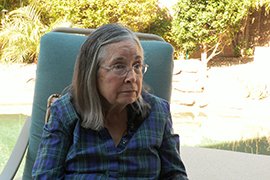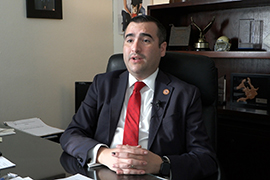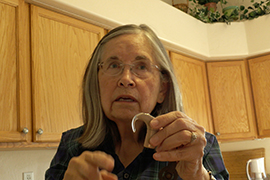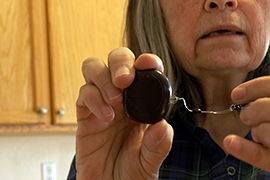- Slug: BC-CNS-Cochlear Implants,970.
- 4 photos, video story available (thumbnails, captions below).
By Maria Staubs
Cronkite News
PHOENIX – The Arizona Senate has passed a bill that aims to expand cochlear implant coverage for adults through Arizona’s Medicaid program.
It would revive coverage of cochlear implants for anyone at least 21 years old who is covered for health and medical services under Arizona’s Health Care Cost Containment System. Currently, only children are covered.
Advocates say SB 1017 could help those with hearing loss, save the state money in long-term health costs and combat unemployment. The bill, which passed the Senate on a 23-6 vote on March 21, is now being read in the House.
Melanie O’Rourke, 73, knows what kind of impact the bill could have on the deaf community.
She lost her hearing due to meningitis 20 years ago and is now president of the West Valley chapter of the Hearing Loss Association of America.
“A lot of times people say losing your hearing is going through a grief. And I did, I was depressed,” O’Rourke said. “I was just trying to figure out what I would do.”
O’Rourke said health professionals pointed her in the direction of a cochlear implant, which helps those whose hearing is not treatable by other means such as hearing aids or amplifiers.
The surgery places a cochlear implant inside the ear, bypassing the damaged portion of the ear and delivering sound signals to the hearing nerve.
Cochlear implants use a sound processor that fits behind the ear, which captures sound signals and sends them to a receiver implanted under the skin behind the ear, according to the Mayo Clinic.
The receiver sends the signals to electrodes implanted in the snail-shaped inner ear, or the cochlea. The signals stimulate the auditory nerve, which then directs the signals to the brain, and the brain interprets those signals as sounds.
“So the sound that I hear is different from the sound that you hear,” O’Rourke said.
O’Rourke explained she had to rewire her brain to recognize certain sounds. She relearned the sound of birds chirping and the clicking of the turn signal on her car.
Her main focus was understanding speech. According to the Mayo Clinic, most people with cochlear implants make considerable gains in this area within three to six months of cochlear implant use.
But the biggest thing on her mind was the impact her hearing loss would have on her profession.
“I was too young not to be able to do what I wanted to do,” said O’Rourke, who was working at a public school at the time.
Only 53.3% of deaf people ages 25 to 64 were employed in 2017, compared to 75.8% of hearing people, according to the National Deaf Center on Postsecondary Outcomes.
“I myself lost my hearing when I was 54; I was fortunate that my husband had good health insurance. I had good health insurance, but it still did not cover, it only covers so much,” O’Rourke said.
Without insurance, a cochlear implant can cost between $30,000 and $50,000, according to Healthline.
O’Rourke said people with hearing loss who don’t have health insurance can have particular challenges in the workplace.
“A lot of people will say they think I’m standoffish … or I’m not listening to what’s being said, but I’m not hearing, and if that hearing could be corrected, they would not have those negative feelings with people at work,” O’Rourke said.
Sen. T.J. Shope, R-Coolidge, who introduced the bill, said cochlear implants for both adults and children used to be covered by AHCCCS, but after the 2008 recession, funding for those 21 and over was eliminated, along with other health-related services.
“These folks, many of them are very well educated and have had a successful career in whatever career field that they’ve chosen and all of a sudden find themselves unable to work,” Shope said.
Dr. Shawn Stevens, neuro-otologist ear, nose and throat surgeon at the Barrow Neurological Institute, told the Senate Appropriations Committee in January that, in the long run, the technology will save money for the state.
He said patients often hold multiple upper-graduate degrees, but they can’t get jobs or hold employment.
“Those individuals end up on state welfare programs and end up sucking money out of the system instead of simple investment being allowed to get them an ability back that would then get them hired,” Stevens said.
With modern technology, cochlear implants can provide 80-85% hearing function and one surgery will last a lifetime, Stevens said.
After O’Rourke’s cochlear implant surgery, she returned to work and began volunteering with cochlear implant company Cochlear Americas. That is also when she started to get involved with the local HLAA chapter.
Donna Sorkin, the executive director of the American Cochlear Implant Alliance, is also an implant recipient. The alliance is a nonprofit aimed at increasing access to cochlear implants.
“A cochlear implant, if they’re eligible for it, is one way to help them have a much higher quality of life and be able to take care of themselves, take care of others in their family,” Sorkin said. “So it’s an important way for us to provide equity for people who are covered by Medicaid and are adults.”
According to a 2019 report by Sorkin published in Otology and Neurotology, approximately 60% of states cover eligible adults for cochlear implants under Medicaid.
Sorkin said her organization estimates that “less than 10% of the individuals who could benefit from this extraordinary technology actually have one,” because people are unaware of the option.
Though cochlear implants don’t give recipients full hearing, Sorkin said, “you really improve to an extraordinary extent.”
“We undervalue hearing – very often we think it’s not that important. But it is such an integral part of who we are and the way we live and the way we communicate. So it’s … an extraordinary opportunity,” Sorkin said of the possibility of expanding Medicaid coverage.
For more stories from Cronkite News, visit cronkitenews.azpbs.org.
^__=
Melanie O’Rourke, 73, lost her hearing 20 years ago. Now, she relies on cochlear implants to hear. (Video screengrab by Maria Staubs/Cronkite News)
Sen. T.J. Shope, R-Coolidge, who introduced SB 1017, discusses how the bill would expand cochlear implant coverage for those 21 years or older under Arizona’s Medicaid program. (Video screengrab by Maria Staubs/Cronkite News)
Melanie O’Rourke shows the sound processor she wears behind her ear. The transmitter sends sound signals to a receiver and stimulator implanted under the skin. (Video screengrab by Maria Staubs/Cronkite News)
Melanie O’Rourke shows the off-the-ear cochlear implant sound processor which sends sound signals to the receiver. The cochlear implant bypasses the damaged portions of the inner ear to stimulate the auditory nerve. (Video screengrab by Maria Staubs/Cronkite News)



